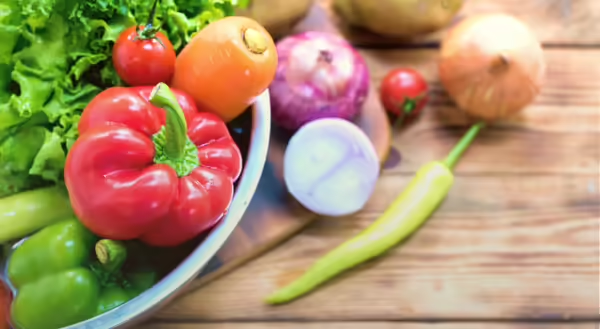
No one like’s having to throw out food because it’s gone bad; that’s hard-earned money down the drain. Fruits and vegetables are some of the most common foods wasted. Knowing how to store produce properly will help them stay fresh and last longer, decreasing food waste.
Some fruits and vegetables should only be stored at room temperature until cut, as refrigeration temperatures can do damage and prevent them from ripening to good flavor and proper texture. This includes citrus fruits (lemons, limes, oranges, etc.) bananas, mangoes, melons, papayas, pineapple, pomegranates, and plantains, as well as garlic, ginger, potatoes, onions, winter squash, pumpkin, and tomatoes. Store produce away from direct sunlight but recognize that onions and potatoes don’t play well together. Ethylene gas, released from the onions can cause the potatoes to sprout; if this happens, the potato is still safe to eat, but remove the sprouts first and do not eat them. However, if soft and shriveled, toss the tater out!
Avocados, kiwi, peaches, pears and plums should be left on the counter to ripen first, then refrigerated and used within 1-3 days. All other produce, such as apples (kept for longer than 7 days), berries, grapes, beets, broccoli, and more, should be placed in separate, partially opened plastic bags and stored in the refrigerator crisper drawer. The vegetable crisper is designed to control the humidity level to help your fresh produce last longer. Use a high setting for any produce that wilts, such as leafy vegetables, like kale and spinach. Set the drawer on the lowest humidity level, which opens the air flow, for citrus fruits like grapefruit and oranges. Set the control somewhere in the middle for most other fruits and vegetables, including apples and grapes. The best advice is to store fruit in one drawer and vegetables in the other.
Head lettuce or leafy greens should be washed and spun dry in a salad spinner or patted dry with a paper towel before refrigerating as they will remain crisper. However, wash all other produce under running water just before using. Special produce washes or detergents are not necessary and should be avoided. All cut or cooked produce should be refrigerated within two hours and kept away from raw meat, poultry and seafood. Storing produce with these practices in mind can help produce last longer and be food safe. That’s money kept in your pocket!
Sources:
Fruits and Veggies More Matters. Storing Fresh Fruits and Vegetables for Best Flavor.
Illinois Extension. Home Vegetable Gardening. Potatoes. extension.illinois.edu
About the Author
Jenna Smith is a Nutrition and Wellness Educator with University of Illinois Extension, serving Livingston, McLean, and Woodford Counties. Smith uses her experience as a registered dietitian nutritionist to deliver impactful information and cutting-edge programs to Livingston, McLean, and Woodford Counties and beyond.